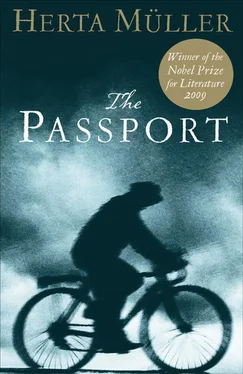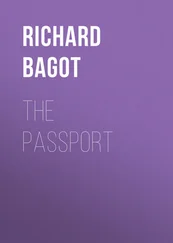“I’ve got a wife,” says the night watchman. “She’s a milkmaid in the cowsheds in the valley.”
Windisch’s wife sees the milkmaid with the blue headscarf standing outside the inn next to Windisch’s bicycle. “I know her,” says Windisch’s wife, “she bought our bed.”
The milkmaid looks across the road to the square in front of the church. She eats an apple and waits.
“I suppose you don’t want to emigrate now,” says Windisch. The night watchman crushes his hat in his hands. He looks over to the inn. “I’m staying here,” he says.
Windisch sees the band of dirt on his shirt. A vein beats on the night watchman’s neck. Time stands still. “My wife is waiting,” says the night watchman. He points over to the inn.
The tailor raises his hat in front of the war memorial. He looks at the tips of his shoes as he walks. He stops at the church door beside Skinny Wilma.
The night watchman brings his mouth up to Windisch’s ear. “There’s a young owl in the village,” he says. “It know its way around. It’s already made Skinny Wilma ill.” The night watchman smiles. “Skinny Wilma is clever,” he says. “She scared the owl away.” He looks over to the inn. “I’m going,” he says.
A cabbage white flutters past the tailor’s face. The tailor’s cheeks are pale, like curtains under his eyes.
The cabbage white flies through the tailor’s cheek. The tailor sinks his head. The cabbage white flies out of the back of the tailor’s head, white and uncrumpled. Skinny Wilma flaps her handkerchief. The cabbage white flies through her forehead and into her head.
The night watchman walks beneath the trees. He pushes Windisch’s old bicycle.
The car’s silver badge jingles in the night watchman’s jacket pocket. The milkmaid walks barefoot in the grass beside the bicycle. Her blue headscarf is a patch of water. Leaves are floating in it.
The prayer leader walks slowly through the church door carrying a thick hymn book. It’s St. Anthony’s book.
The church bell strikes. Windisch’s wife is standing at the church door. The organ hums through Windisch’s hair in the dark air. Windisch walks down the bare passageway between the benches with his wife. Their heels click on the stone. Windisch’s hands are clasped. Windisch is hanging from his wife’s golden cross. A tear of glass hangs on his cheek.
Skinny Wilma’s eyes follow Windisch. Skinny Wilma lowers her head. “He got that suit from the army,” she says to the tailor. “They’re taking communion and haven’t confessed.
Banat: Former Hungarian province under the Habsburg monarchy. After the First World War it was divided between Romania and Yugoslavia.
Swabians: The German-speaking minority in the Banat (as distinct from the ’Saxons,’ the German-speaking minority of Transylvania, also in Romania).
Wallachian: A term of abuse for Romanians used by German and Magyar speakers in Romania. From the Romanian province of Wallachia.

This edition published in 2009
First published in this translation in Great Britain in 1989 by
SERPENT’S TAIL
an imprint of Profile Books Ltd
3A Exmouth House
Pine Street
London ECIR OJH
www.serpentstail.com
First published as Der Mensch ist ein grosser Fasan auf der Welt
By Rotbuch Verlag, Berlin, 1986
Copyright © Rotbuch Verlag, 1986
Translation copyright © Serpent’s Tail, 1989
1 3 5 7 9 10 8 6 4 2
Printed in the UK by CPI Bookmarque, Croydon, CRO 4TD
The moral right of the author has been asserted.
All rights reserved. Without limiting the rights under copyright reserved above, no part of this publication may be reproduced, stored or introduced into a retrieval system, or transmitted, in any form or by any means (electronic, mechanical, photocopying, recording or otherwise), without the prior written permission of both the copyright owner and the publisher of this book.
A CIP catalogue record for this book is available from the British Library.
ISBN 978 1 85242 139 7
eISBN 978 1 84765 249 2















